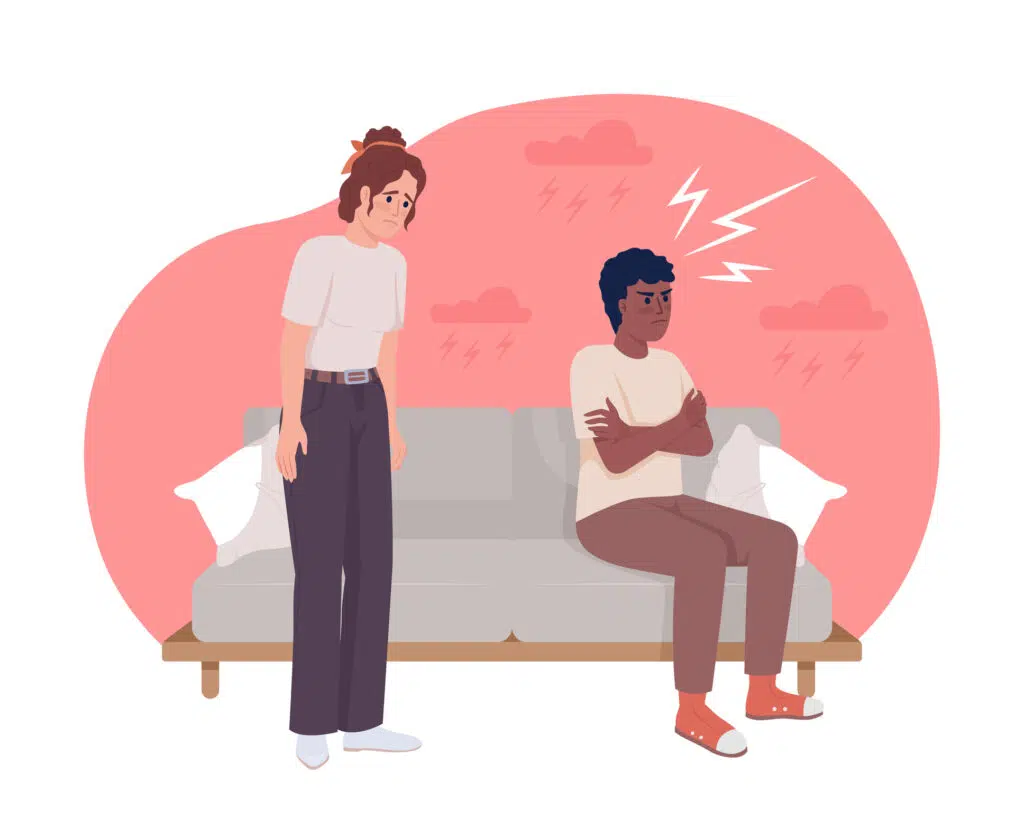How Do I Establish Healthy Boundaries

We often talk about setting healthy boundaries in the workplace, in relationships, with technology, and with ourselves. But what is a healthy boundary, why should you have them for your mental health, and what’s the best way to establish healthy boundaries? Let’s dive in.
What Are Healthy Boundaries?
A healthy boundary is a limit you establish to protect your physical or mental well-being. You’re setting what is acceptable and what isn’t so that you can create a sense of safety and well-being. Because you can have boundaries in so many areas of your life, it can look very different for everyone.
Here are some examples of healthy boundaries:
- Digital space: Silencing notifications at certain times so you can unwind after a busy day.
- Relationships: Saying no to requests that drain you of energy.
- Work: Leaving work at a suitable time to prevent burnout.
- Self-Care: Prioritizing sleep and exercise to avoid feeling overwhelmed.
- Emotional Well-being: Avoiding negative people or situations that trigger negative emotions.
These are just a few ways to set boundaries with yourself and the people in your life. Boundaries act like a protective shield, allowing you to create time for self-care, and avoid burnout. By preserving your mental, emotional, and physical well-being, you can prioritize activities that you enjoy and make you feel rested.
Constantly overworking and overextending yourself in multiple areas of your life can make you feel more vulnerable to stress and anxiety. According to one survey, most Americans think setting boundaries in a relationship is important, with 57% saying it’s very important.
When it comes to the art of saying no, Gen Z struggles the most. Across generations, many Americans are using excuses to get out of events instead of saying no, with sickness and double bookings being the most popular excuses.
Can You Have Too Many Boundaries?
While setting healthy boundaries is key to preserving your mental and emotional well-being, it’s important to be realistic. Too many boundaries could have potential downsides:
- Isolation and missed connections: Excessive boundaries can get in the way of forming meaningful relationships.
- Missed opportunities: Rigidity can prevent personal growth and positive experiences.
- Difficulty adapting and compromising: Inflexibility can lead to conflict and missed resolutions.
- Trust issues: Excessive boundaries can stem from difficulty trusting others.
How To Establish And Communicate Healthy Boundaries
Setting boundaries isn’t always an easy process, but it is an important part of looking after your mental and physical health. Establishing and communicating your boundaries is a journey; here’s where to start.
Identifying Your Personal Boundaries
What is important to you? What do you value most? What is something that completely drains you of energy?
These are all important questions to ask yourself. The first step in setting boundaries is finding out your limits. Identifying personal boundaries can include romantic relationships, friendships, family relations, work settings, and your day-to-day. As you think about your starting point, keep in mind that there are several types of boundaries to consider:
- Physical: Comfort level with touch, proximity, and personal space.
- Emotional: Protecting your emotional well-being and managing your feelings.
- Mental: Protecting your thought processes, opinions, and beliefs.
- Sexual: Your comfort level with intimacy.
- Material: Protecting your belongings and possessions.
- Time: Managing your time and energy.
- Communication: Defining how you communicate with others.
Nurturing Your Physical Well-being
Setting boundaries establishes limits to help prevent burnout. By setting limits in areas of your life, you can give yourself more time to focus on physical self-care. Regular exercise, healthy eating, and good sleep support physical and mental well-being.
When you feel rested and physically healthy, you are in a better position to reinforce your boundaries, helping you to build resilience and manage stress.
Caring for Your Emotional Health
Healthy boundaries can be in all parts of life. Think about how your boundaries can support your emotional health and what that looks like for you. That could include setting aside time for mindfulness practices and turning off your phone for 30 minutes of peace.
Setting your boundaries is a part of your self-care routine, as you’re creating space in your day to focus on activities that build you up, not drain yourself of energy. Surrounding yourself with people who respect your boundaries is also essential.
Social Boundaries And Relationships
Terms like toxic, gaslighting, and narcissism are used a lot these days when talking about unhealthy relationships. In relationships, healthy boundaries are important in communicating our needs, setting expectations, encouraging open communication, and increasing a stronger sense of self.
Here are some examples of boundaries with friends and romantic partners:
- Respecting Personal Space: Giving each other space for individual hobbies, interests, and friendships, understanding the importance of maintaining independence within the relationship.
- Effective Communication: Discussing feelings, needs, and concerns openly and respectfully, without fear of judgment or retaliation.
- Setting Mutual Goals: Collaborating on shared ambitions while also supporting each other’s individual goals and dreams.
- Maintaining Autonomy: Encouraging each other to pursue personal growth and development, recognizing that each person’s happiness and fulfillment are essential to the health of the relationship.
- Respecting Availability: Understanding and accepting that friends may not always be available due to other commitments or personal needs without feeling neglected or resentful.
Healthy Boundaries At Work
Boundaries at work is another big topic. One survey found that setting boundaries at work could boost satisfaction, with 40% of quiet quitters more engaged at work after setting boundaries. Another report states that burnout is still on the rise, with 42% of the workforce experiencing it. Researchers found that women and younger people are significantly more likely to say they are burned out.
While many of us know what healthy boundaries at work look like, enforcing them can feel like a whole other challenge. Difficulty saying no, fear of negative repercussions from colleagues, or hesitation in challenging superiors can all make it tough to establish boundaries at work. But you can create a healthier work-life balance and establish boundaries that protect your well-being.
Speaking to a therapist can help you navigate through challenging life milestones, improve self-esteem, or teach you skills to communicate more confidently. If you’re struggling to identify your needs and values or repeatedly struggle to enforce boundaries, talking to a therapist can help you navigate difficult situations more effectively.
Making Self-Care And Healthy Boundaries A Priority
Self-care can set the foundation for a healthy body and mind. Setting boundaries helps to protect and enhance self-care as they allow you to prioritize activities and practices that nourish your health. A lack of healthy boundaries can leave you more vulnerable to the effects of anxiety, stress, and even exhaustion. Ultimately, it’s about creating time, space, and resources to prioritize self-care so you’re ready to take on everything life throws at you.
By recognizing and honoring our limits, we empower ourselves to navigate relationships, work, and our personal lives with clarity and respect. If you find yourself struggling to set boundaries or maintain them, seeking guidance from a qualified therapist can help.
At Thriving Center of Psych, we offer therapy services tailored to your unique needs. Take the first step towards a more balanced life by booking an appointment with one of our experienced therapists today.

How to Move On After a Friendship Breakup
Friendship breakups can sting just as much as a romantic breakup. After all, you’re experiencing a loss of shared history and an understanding of each other that can leave you feeling lonely and isolated. Not all friendships are forever, but moving on from the loss of a friendship does take time and some self-compassion.

Signs You’re in a Toxic Relationship
A toxic relationship can chip away at your well-being and happiness. Toxic partners can be manipulative and charming, making it difficult to recognize the signs that you’re in a toxic relationship. You deserve to be in a supportive and healthy relationship.

10 Common Marriage Reconciliation Mistakes to Avoid After Infidelity
Infidelity can leave couples devastated. If you’ve been affected by infidelity and want to salvage your relationship, rebuild trust, or make a tough decision, keep reading for 10 common reconciliation mistakes to avoid after infidelity.

Survey: 72% of Americans are Stressing About the Upcoming Presidential Election
Political viewpoints in the U.S. have always been contentious, but is the impact of politics in the United States making it difficult for people to live their everyday lives? With some anticipating another brutal and long campaign season ahead of the upcoming 2024 presidential election, nearly half of Americans say politics is negatively impacting their mental health.




